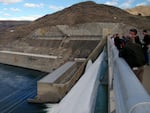
File photo of a group touring Grand Coulee Dam. Tribes and power planners are considering restoring salmon to the Upper Columbia Basin above the dam.
Tom Banse / Northwest News Network
Operators of the biggest dam in the Northwest will now have to reduce oil spills that pollute the Columbia River. The U.S. Bureau of Reclamation settled a lawsuit Thursday with the environmental group Columbia Riverkeeper.
The group sued the Bureau of Reclamation last June to reduce water pollution coming from oil spills and leaks from Grand Coulee Dam in North Central Washington.
Columbia Riverkeeper had previously settled a similar lawsuit with the U.S. Army Corps of Engineers over oil spills at eight other dams on the Columbia and Snake rivers, including Bonneville, The Dalles and Ice Harbor dams.
The Department of Justice says this latest settlement means the Bureau of Reclamation must test out eco-friendly lubricants that will biodegrade or switch to machinery that doesn't use oils.
Brett VandenHeuvel, executive director of Columbia Riverkeeper, says oil dripping from turbines or spilling into the water can carry with it toxic materials, like PCBs.
"That can bioaccumulate, cause cancer, nervous system problems, and so getting toxic oil out of the river is good for fish and wildlife, and it's good for the people that rely on that fish and wildlife," VandenHeuvel said.
The Bureau of Reclamation said there are oil spill prevention plans in place at the dam.
"There are preventive measures in place to prevent major spills from happening. When it does happen, we know about it very quickly," said Bryan Horsburgh, the bureau's Pacific Northwest region resource services manager.
Horsburgh said operations won't change at Grand Coulee dam until after studies on the feasibility of eco-friendly lubricants are finished.
Since the first settlement with the Army Corps of Engineers in 2014, that agency has started using eco-friendly oils on some of its machinery and is conducting field tests on turbine parts at Bonneville Dam.
With those switches, VandenHeuvel said the rivers are already less polluted. He hopes other dam operators in will take notice.
"Two of the largest dam operators in the Pacific Northwest, two federal government agencies, have realized that this was necessary to reduce pollution," VandenHeuvel said. "We're very hopeful that through discussions or additional litigation that we can (continue to) reduce the amount of oil into the Columbia and other tributaries throughout our entire region."
